Competencies
The competencies are the identifiable and evaluable combination of knowledge, attitudes, values, abilities and skills, and their relation to each other, that will allow the student to exercise their professional activity in accordance with the demands and standards of the corresponding occupational area.
All the Doctorates at the University of Almería explicitly consider two types of competencies:
- The generic competencies included in Royal Decree 1393/2007, of October 29, which establishes the organization of official university education, modified by RD99 / 2011, of January 28, which regulates official doctoral studies.
- The specific degree competencies - these competencies are detailed in the degree report and are related to the degree’s own disciplines. Some of these competencies may have been agreed upon at the Andalusian regional level, or, for certain degrees, be regulated at the State level.
Basic competencies established for the doctoral studies.
- CB11 - Systematic understanding of a field of study and mastery of research skills and methods related to that field.
- CB12 - Ability to conceive, design or create, implement and adopt a substantial research or creation process.
- CB13 - Ability to contribute to the expansion of knowledge frontiers through original research.
- CB14 - Ability to perform a critical analysis, evaluation and synthesis of new and complex ideas.
- CB15 - Ability to communicate with the academic and scientific community, and with society in general, about their fields of knowledge in the manner and languages commonly used in the international scientific community.
- CB16 - Ability to promote, in academic and professional contexts, the scientific, technological, social, artistic and cultural advancements within a knowledge-based society.
Personal skills and abilities
- CA01. To manage in contexts for which there is little specific information.
- CA02. To find the key questions that must be answered to solve a complex problem.
- CA03. To design, create, develop and undertake novel and innovative projects in one’s field of knowledge.
- CA04. To work both in a team and independently in an international or multidisciplinary context.
- CA05. To integrate knowledge, confront complexity and make judgements with limited information.
- CA06. The intellectual criticism and defence of solutions.
Other competencies
- CE01 - Work on the acquisition of advanced knowledge, in subjects related to mathematics and its applications, in the context of internationally recognized scientific research.
- CE02 - Develop skills that enable academic and scientific autonomy and make it possible to lead and manage work teams and innovative (research) projects
- CE03 - To design strategies of collaboration with existing teams, in these and other universities and national and international institutes, that allow to optimize the resources of each one of them, the interdisciplinary treatment of problems and its solutions, and the integration of each one of its components.
- CE04 - Apply and disseminate the results worked and obtained; with special emphasis on publishing them, if possible in quality journals, exposing them in scientific meetings and seminars, disseminating them through the media and digital networks, and seeking the possible impact of their applications in science and technology









